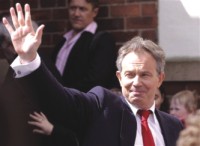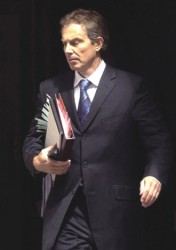| Food for Thought
Liars, Lawyers and Leadership
Farah Ghuznavi
 |
Leaving behind a legacy of lies |
Last month (finally!) saw the departure of Tony Blair as British Prime Minister, a role that he has possibly relished in the last few years as much as some of us have bitterly regretted that he ever attained it. When New Labour swept to power over a decade ago, disillusioned British voters were desperate for change. As a young, energetic and charismatic politician, Tony Blair not only promised change, he appeared to personify it.
If voters had only known then what they know about his character now, an enormous amount of disappointment and frustration could have been avoided. In the last few years, the Labour Party has been haemorrhaging its membership, with increasing numbers of ordinary members leaving in protest at the policies of a government that, despite its many so-called “consultations”, does not appear to hear anything that it disagrees with the Iraq war being only the most obvious example!
 |
No allegations could be made to stick on the 'teflon' politician. |
Unfortunately for those who believed in New Labour, the only change seen during Blair's years as Prime Minister relate to the ideological dilution of key principles of (what had once been) the Labour Party, and the growing moral elasticity of the ministers (read: cronies) that he appointed. Indeed, the main aspect of this “change” was that it constituted “business as usual” it was just that previously, tendencies towards hypocrisy, financial misdemeanours and sex scandals had primarily been associated with the Conservative Party!
In office, Tony Blair was infamous for being such a smooth talker that he managed to slither out of almost any tricky situation. In fact, he earned himself the reputation for being a “teflon” politician because somehow, no allegations could be made to stick, and public opposition to unpopular policies such as the invasion of Iraq or developing a new nuclear deterrent never seemed to slow him down. And even when the going got tough, the Prime Minister's capacity for blatant and fluent lying rescued him from any potential consequences, even as it earned him the well-deserved nickname of “Bliar”.
One of the clearest examples of Blair's preoccupation with style over substance (not to mention truth!) was seen on the issue of climate change. Despite his (many) claims of prioritising the environmental agenda, as with so many other issues during the Blair era, such fictions had little to do with the reality on the ground. According to the green charity Friends of the Earth, green taxes have fallen since Labour came to power despite promises to increase them and even more alarmingly, carbon emissions continue to rise.
Instead of implementing policies that would substantially address these issues, the Blair government focused on publicity stunts such as organising meetings with rock stars in order to promote the New Labour image of “Cool Britannia”. The lead singer of Radiohead, an ambassador for Friends of the Earth, was invited to Downing Street to discuss climate change with the Prime Minister. But he refused on the grounds that Blair was a man with “no environmental credentials”, that dealing with his “spin doctors” had made the singer feel “physically ill”, and that the whole thing was “a nasty business”. (UK Independent)
Tony Blair's term in government saw a series of revelations about sleazy alliances and underhand dealings. Even within government, his decisions frequently seemed to be based on self-serving political alliances rather than anything approaching professional conduct or high ethical standards. There has been considerable unease, for example, about the Attorney General, Lord Goldsmith's role in providing legal advice about the government's decision to go to war in Iraq.
After he was asked for advice on the legality of the war, in a memo dated March 7, 2003, Lord Goldsmith warned that some courts might require further approval from the UN Security Council before any military action could be undertaken. Strangely enough, in his final advice to the government ten days later on March 17, he came to the unequivocal conclusion that the use of force was justified. And within days of presenting his opinion, British troops were sent into action. As a result of this mysterious change of heart, Lord Goldsmith has consistently faced accusations of coming under political pressure to change his views; although he has denied this, many remain unconvinced.
Even more disturbing have been the revelations by a former Blair aide that the media mogul, Rupert Murdoch (widely despised by most left-wing politicians and commentators) was highly influential within the Blair government. According to Lance Price, who acted as deputy to the Prime Minister's press secretary (and chief spin doctor) Alastair Campbell, Mr. Murdoch was like “the 24th member of the Cabinet”, and his silent presence in government decisions was one of the Prime Minister's most sensitive secrets.
Indeed, Price revealed that when he submitted his book about his years in Downing Street for vetting, there were more objections to his references to Mr. Murdoch than to anything he wrote about Blair's troubled relationship with the current Prime Minister, Gordon Brown! In Price's words, “The close relationship between Tony Blair, New Labour and Rupert Murdoch… won the government invaluable support” in terms of the media organisations controlled by Murdoch, but this support came “at a high price.” (UK Independent)
The extent of Murdoch's role in Downing Street decision-making is likely to emerge gradually, but it's well known that the media tycoon attempted to influence decisions on issues where he felt strongly e.g. the invasion of Iraq. After months of avoidance and stalling tactics, the government has recently disclosed, in response to requests made under the Freedom of Information Act, that Tony Blair had three conversations with the Rupert Murdoch in the nine days before the start of the Iraq war. The subject of the conversations was not disclosed, but the timing is undoubtedly significant; as are the conversations that Blair had with Murdoch during other key events, such as the publication of the Hutton Report investigating the death of the scientist Dr David Kelly, who had discussed with a reporter (Andrew Gilligan) how the case for war had been politically motivated, and information within the so-called "dodgy dossier" had been manipulated.
While these revelations are undoubtedly shocking, many within the Labour Party have also been unhappy about the more general lowering of standards among politicians in terms of principles and behaviour, a trend that has increasingly emerged during the New Labour era. For example, when the Deputy Prime Minister John Prescott came under fire because of his affair with his secretary and allegations that he had violated civil service rules against “improper” conduct during work hours, Mr. Blair made a point of defending this rather unsavoury conduct, as well as supporting what was clearly Mr. Prescott's determination to keep the “perks” of his job and his 133,000 pound salary, even though he lost the Whitehall department that he was being paid to manage. In the words of one Labour MP, “He has all the fringe benefits… but it's not clear what his position is. That's what makes people cynical about politics and John in particular.”
And if the British public has been growing increasingly cynical about politicians, it's not hard to see why. After the Iran hostages affair, when a number of British sailors were taken captive and accused of spying by the Iranians, the Defence Secretary, Des Browne, allowed the sailors to sell their stories to tabloid newspapers, something unheard of in any previous administration. To make matters worse, Browne initially claimed that he had only been asked to “note” the Navy's decision to allow the sailors to sell their stories. It subsequently emerged that the Navy's own regulations require the Defence Secretary to give personal permission before sailors can speak publicly about “controversial” decisions. Despite the observation from previous defence secretaries that Mr. Browne was “very inexperienced” and that the decision to allow media deals had been a “serious misjudgement”, Mr. Blair stood by Mr. Browne, presumably in yet another endorsement of dubious behaviour on the part of his political allies.
The rest of the world was not so forgiving, and this was one incident that generated an international fall-out. According to the New York Times “The spectacle of Royal Navy sailors and marines… returning home to sell their stories to the tabloids has Britain wondering what's happened to a military once famous for bravery, valour and toughness.” The Accra Mail in Ghana was even more forthright in its description of the sailors' behaviour, stating that “There is ample evidence to suggest that a lot of what some of the naval personnel are now saying borders on gross exaggeration and downright distortion”. In its elegant prose, The Hindu newspaper in India provided the most pithy analysis: “The 'stories' of course are a euphemism for their self-serving accounts of their two-week captivity. Because their versions reinforced the British-American efforts to demonise Tehran, London wanted the world to hear them while pretending that these were independent voices.”
Indeed, the range of criticism provoked by Blair's behaviour has not been limited to journalists, or his internal critics in the Labour Party; they constitute a fairly diverse cross-section of individuals. Perhaps most disappointed have been those who initially believed in his promises of different priorities and ethical politics. Yet time and again, New Labour's claims of consultative government have been proved to be utterly fictitious.
One example of this was the so-called consultation exercise that took place over the government's plans for a new generation of nuclear power stations. Greenpeace, the environmental campaign group, accused the government of acting illegally by failing to consult properly on its nuclear power plans before approving those plans. Greenpeace won the case after the High Court ruled that the government had been staging a “sham” consultation exercise, and Mr. Justice Sullivan described the exercise (which lasted only 12 weeks!) as “seriously flawed” and “misleading”. (UK Independent)
Some of the Prime Minister's critics have been fairly straightforward in their comments, and while pithy language is to be expected from political rivals, Mr. Blair has had the dubious distinction of attracting such criticism from less predictable sources. For example, the former chief inspector of prisons has described the 60 pieces of legislation introduced since 1997, as having contributed to higher prisoner numbers and put pressure on an already overcrowded system that is desperately in need of additional resources. According to Lord Ramsbotham, Tony Blair is overloading the penal system with a blizzard of “incoherent” legislation and he went as far as to say “I just wish he'd shut up, frankly”!
In conclusion therefore, there are clearly many people who are breathing a sigh of relief at Mr. Blair's departure from the UK's domestic political scene even if one wishes that this departure could have come some years earlier, saving untold lives in the process. The prolonged farewell that has characterised Tony Blair's final departure from prime minister-ship has been described as the longest goodbye ever in politics. Perhaps the only period longer than that goodbye has been the painful and bitter process of disillusionment with New Labour that preceded it…
Copyright
(R) thedailystar.net 2007 |
|
